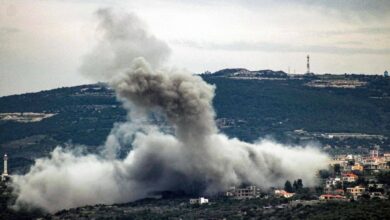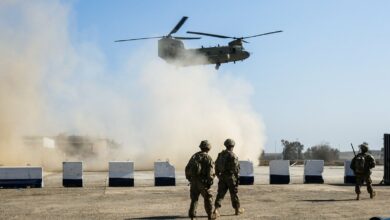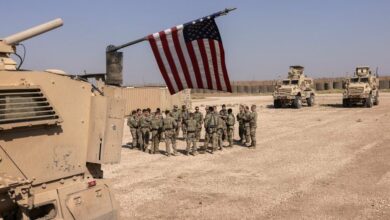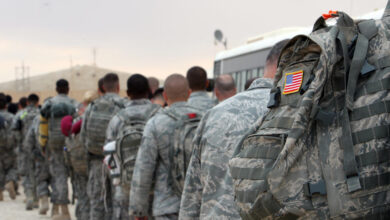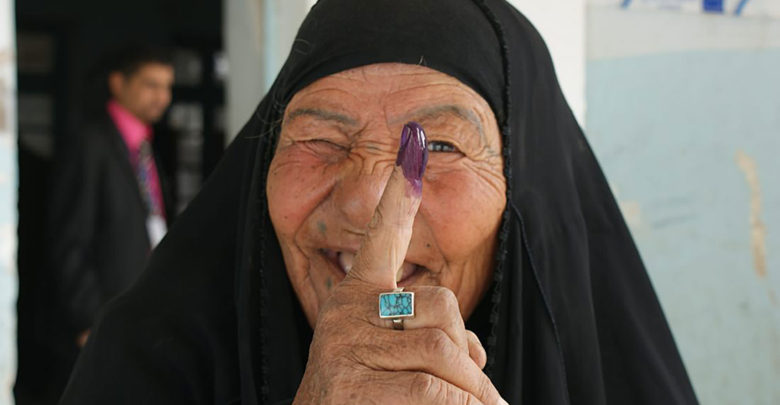
After the military victory over Islamic State, Iraq’s critical elections – scheduled for May 12, 2018 – will likely shape the future of the country.
In the inaugural installment of our War of Words debate series, we ask: what role the Hashd al-Shaabi militias and their leaders play in the Iraqi political arena?
Dr. Nussaibah Younis and Dr. Renad Mansour, both from Chatham House, give their views on the militias’ role in Iraqi politics and the 2018 election.
Murky and hard negotiations await Baghdad
Nussaibah Younis
The process of forming coalitions to contest Iraqi elections is always fraught, but 2018 has been particularly complex. The last Iraqi parliamentary elections took place in 2014, shortly before ISIS seized one-third of Iraq’s territory. Since then, the ISIS advance and the subsequent war to defeat the extremist group has transformed the fortunes of Iraqi political actors – but no one quite knows by how much.
The clear winner in 2014, former prime minister Nouri al-Maliki, is now much diminished, after facing external and internal admonishment for allowing ISIS a massive victory. Meanwhile, Prime Minister Haider al-Abadi and an assorted group of militias called Hashd al-Shaabi or the Popular Mobilization Forces have seen their popularity soar, as they have taken credit for the defeat of ISIS.
Abadi, however, has been deprived of access to the Da’wah party electoral machine because of opposition by fellow Da’wah party leader Maliki to his political ascension. Abadi has therefore been keen to find an electoral alliance that could help him to translate his massive anticipated personal vote-drawing power into a political apparatus for governing. Meanwhile the PMFs have been torn between confidence that they will achieve substantial electoral gains, and fears that the international community will seek to prevent them from seizing the reins of power.
It appears that Iran’s meddler extraordinaire Qasim Soleimani stepped in, during a recent visit to Baghdad, to convince Abadi to join forces with the PMF coalition – giving the PMF international cover and Abadi a political machine. The coalition collapsed after just one day in unclear circumstances, but much damage had already been done. Sunni Iraqi politicians who had supported Abadi were devastated by his willingness to join forces with the PMF, and the international community was left questioning the veracity of Abadi’s claims that he is committed to demobilising the PMF.
Now, the Iraqi political landscape looks fractured going into the elections. There are multiple Shia, Sunni and Kurdish coalitions, each hoping to demonstrate their relative power in the new Iraqi political reality. This means that there are numerous possible alliances that could be formed after the elections to take power. As in previous elections, Iran is likely to attempt to persuade Iraq’s Shia parties to work together to form a super-majority in government – thereby protecting the future of the PMFs and securing Iranian interests in Iraq. If the Shia do not work together, however, then Iraqi Sunni and Kurdish parties may have the opportunity to play king-maker and determine which Shia faction wins power. Which Shia faction they chose to ally with is likely to depend on what concessions are offered. The Kurds in particular are pinning their hopes on a post-election deal that could help them restore their status in Iraq, which has been much weakened by the catastrophic independence referendum.
The outcome of the Iraqi elections must be respected, but the nature of the electoral system, and the proliferation of small coalitions who have entered the election, means that there is unlikely to be any clear winner. Rather, everything will depend on who can assemble the largest governing coalition after the election. If the United States seeks a favourable outcome, it must be deeply engaged in helping to broker positive post-election alliances. Iran will certainly be closely involved in the process, and, if the U.S. remains absent, it will cede important political ground that could shape the prospects for stabilization in Iraq.
 Dr. Nussaibah Younis is an Associate Fellow at Chatham House, and an expert on the economy, politics, and foreign policy of Iraq. She also serves as a senior adviser to the European Institute on Peace where she advises on high-level mediation efforts in Iraq. She previously directed the Task Force on the Future of Iraq, which was chaired by Ambassador Ryan Crocker, in her role as a senior fellow at the Atlantic Council in Washington D.C.
Dr. Nussaibah Younis is an Associate Fellow at Chatham House, and an expert on the economy, politics, and foreign policy of Iraq. She also serves as a senior adviser to the European Institute on Peace where she advises on high-level mediation efforts in Iraq. She previously directed the Task Force on the Future of Iraq, which was chaired by Ambassador Ryan Crocker, in her role as a senior fellow at the Atlantic Council in Washington D.C.
Follow her on Twitter: @Nussaibah
Militias are not going anywhere – get ready to live with them
Renad Mansour
In 2014, the Popular Mobilization Forces, an umbrella organization incorporating some 50 militias, was formed in response to Islamic State, which conquered one-third of Iraq’s land. Now that ISIS has lost its territory, many are calling for PMF disbandment. However, the PMF is not going anywhere anytime soon. Instead, it’s taking part in the re-building. What explains this persistence?
First, the leading groups within the PMF existed long before ISIS declared its caliphate, including the Badr Organization (1982), Asa’ib Ahl al-Haq (2006), Kata’ib Hezbollah (2007) and Harakat Hezbollah al-Nujaba (2013). Although most of the post-2014 formed groups will disband or integrate, there is no reason to expect these stronger groups to pack up and go home. The focus is therefore on these groups.
In the West, the usual critique of these groups focuses on sectarian discourse or the Iran factor. Many label the groups “terrorists,” a term useful in political but not analytical circles. While the PMF are not at times without sectarian elements, including fiery speeches and banners, the PMF groups are also capable of shifting tones and serving multiple roles. And their leaders have not always been persona non grata: only a few years ago, Badr leader Hadi al-Ameri even visited the White House. According to various Western diplomatic sources, these PMF officials are open to cooperation.
Our analysis must go deeper. In a context where the Iraqi state remains weak and power dispersed, the biggest challenge that the PMF represents is its durability. According to Iraqi law, the PMF is both an independent institution and part of the state under the auspices of the prime minister’s office. Under this ambiguous definition, it manoeuvres between state and non-state actor, both cooperating and contesting the state, as its interests dictate.
Baghdad still shares capacity, legitimacy and power with the PMF. For instance, last October, Iraqi Prime Minister Haider al-Abadi’s battle-weakened state armed forces depended on PMF capacity support to present a stronger challenge to the Kurdish Peshmerga forces in the retaking of Kirkuk. In this instance, the militias cooperated with Baghdad. At other times, PMF leaders have challenged Abadi’s strength.
In the PMF debate, the issue of legitimacy is often overlooked. But its legitimacy goes beyond ambiguous – and seemingly paradoxical – legal justifications. Despite the tone in Western capitals, the PMF is popular particularly among Iraq’s majority Shia population, who value the fighters who died fighting to defend their country, and believe that Grand Ayatollah Ali al-Sistani’s religious ruling (fatwa) guided recruits. In many circles, an aura of prestige surrounds its veterans.
The PMF’s first choice is to become the state. At the national level, several have formed the electoral bloc “Fatah” (a word derived from a historical Islamic victory) and plan to compete in the upcoming government formation. At the local level, the groups’ power extends beyond the Shia majority provinces. In Diyala, for instance, the Badr Organization has gained control over several institutions, including the police force. In Sunni areas, the PMF has developed proxy armed allies, known as the “Sunni-PMF,” as well as political allies who will compete for the power vacuum in the provincial councils after ISIS.
Unlike former Prime Minister Nouri al-Maliki’s fight against militias in 2008, Abadi has little choice today but to cooperate with the PMF. Rather than unrealistic blanket calls for disbandment, the solution is building a responsive and representative state capable of discerning the line between state and non-state actor and commanding loyalty from legitimate violence – a big ask at the moment.
 Dr. Renad Mansour is a research fellow in the Middle East and North Africa Program at Chatham House and a senior research fellow at the Iraq Institute for Strategic Studies in Beirut. He received his PhD from Pembroke College, Cambridge.
Dr. Renad Mansour is a research fellow in the Middle East and North Africa Program at Chatham House and a senior research fellow at the Iraq Institute for Strategic Studies in Beirut. He received his PhD from Pembroke College, Cambridge.
Follow him on Twitter: @RenadMansour


